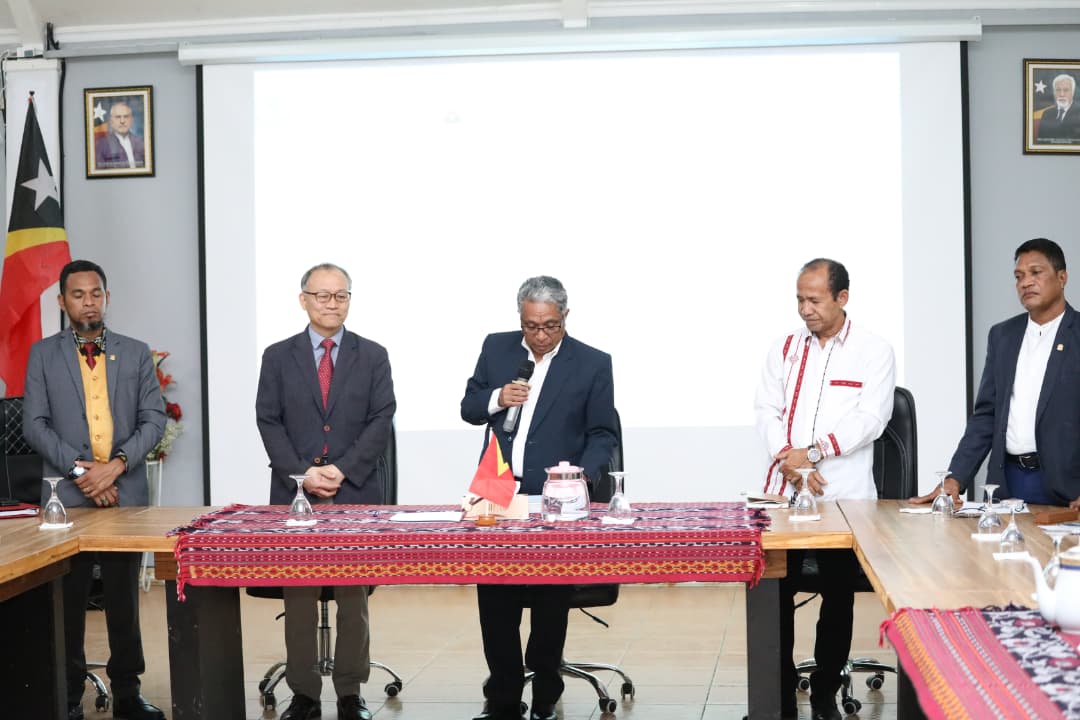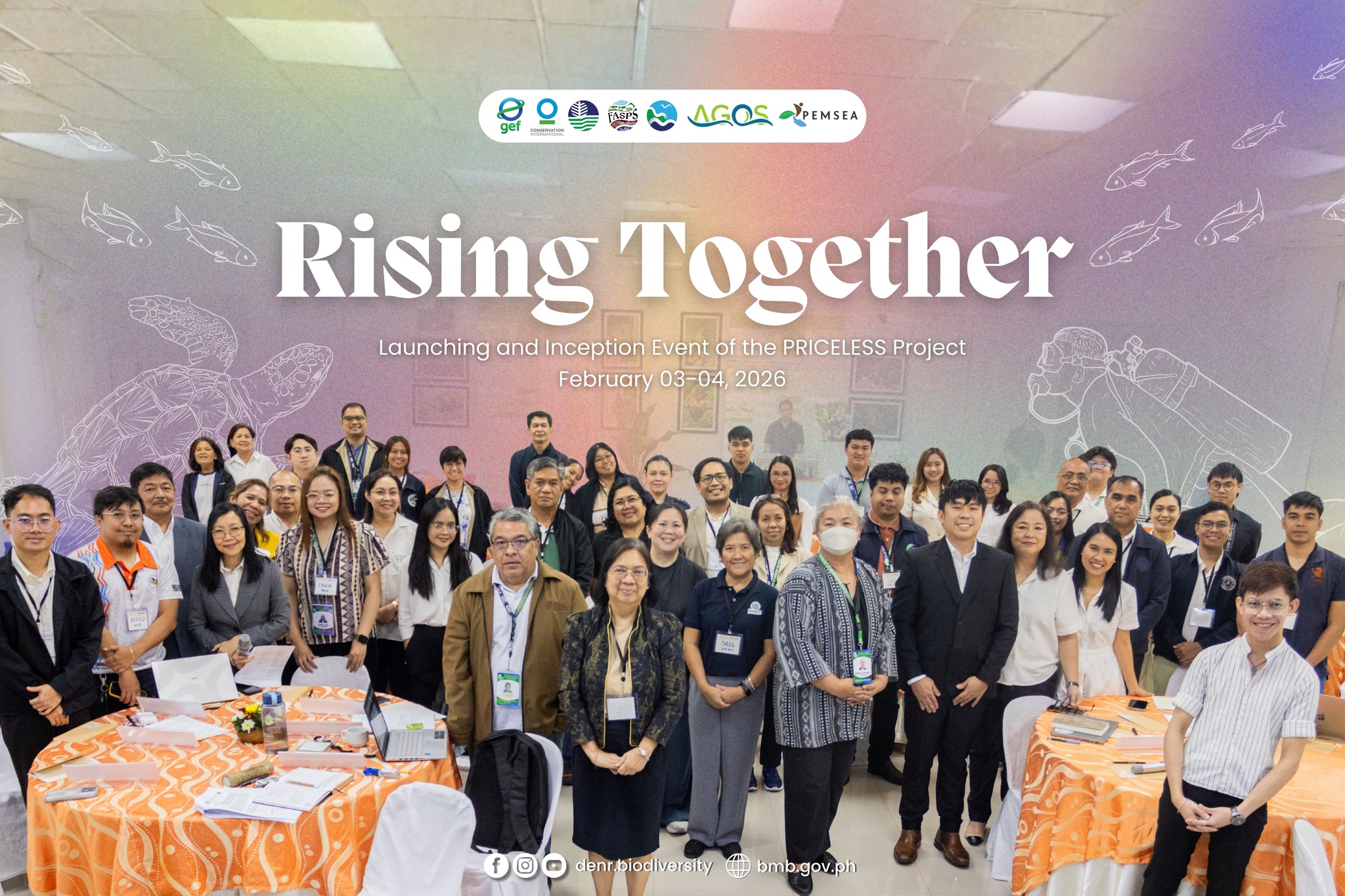Regional Experts Advance Ocean Health and Economy at the Blue Economy Forum 2017
Friday, 8 December 2017
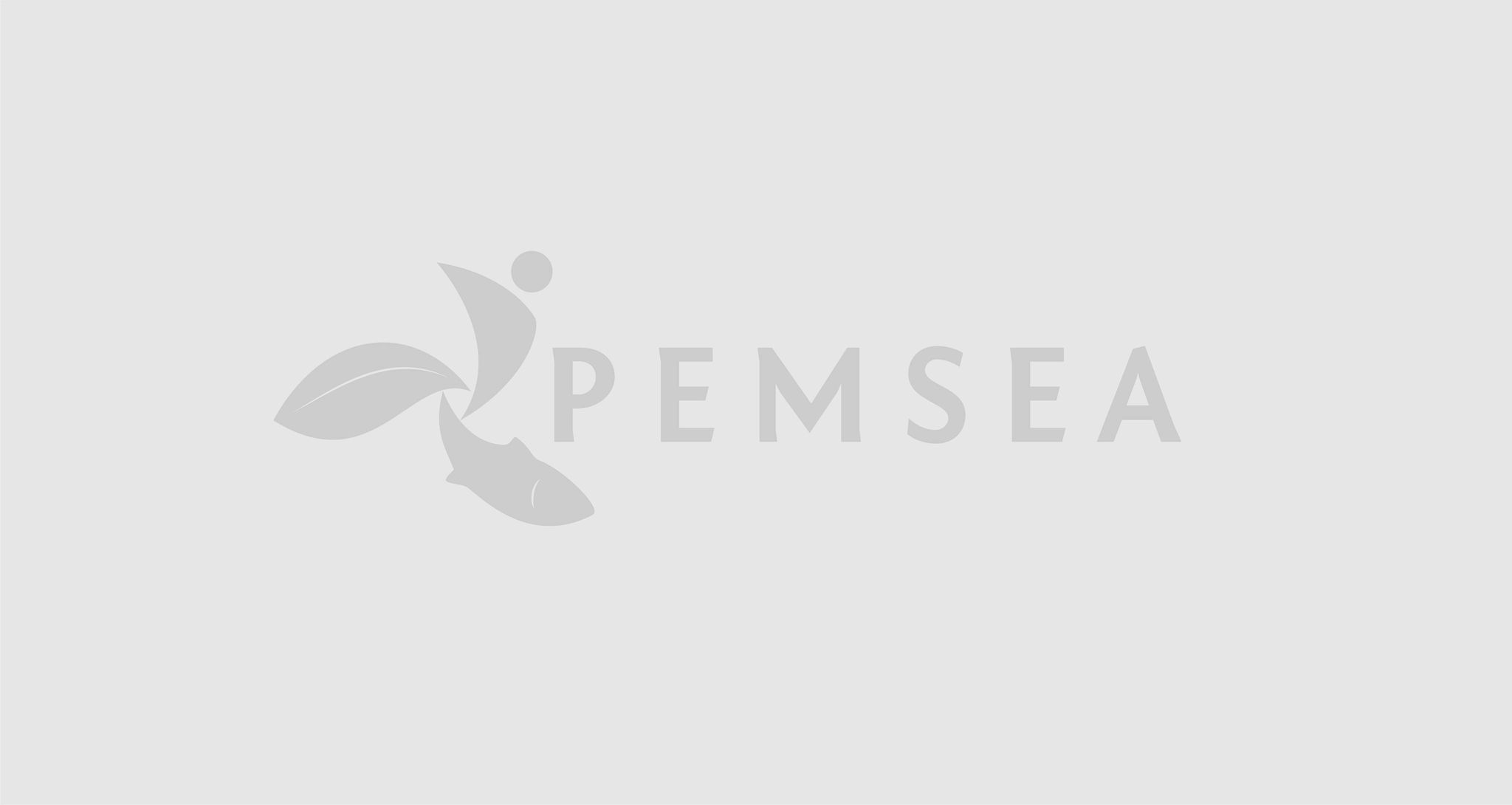
BANGKOK, THAILAND — Decision-makers and leading experts from ministries, industry, the academe and international organizations convened for the first regional Blue Economy Forum, held 14-15 November 2017 at the Miracle Grand Convention Hotel in Bangkok, Thailand.
The East Asian Seas region is a center of both marine biodiversity and economic growth, but complex pressures and threats are affecting the state of ocean health and the ocean-based economy. Co-organized by PEMSEA and the Thailand Research Fund, the two-day forum sought to raise the ocean agenda and the vital role that oceans and marine ecosystems play in economic development, welfare and resiliency, along with food, water and energy security. The more than 100 participants agreed that business as usual is no longer an option in the face of a changing environment and climate. They underscored the need to prioritize critical challenges and regard economic growth and healthy oceans as compatible propositions. New actions, innovations and partnerships taking place in the region demonstrate workable solutions and tremendous potential for blue economy development.
Joined by Mr. Stephen Adrian Ross, Executive Director of PEMSEA and Dr. Suthipun Jitpimolmard, Director of the Thailand Research Fund, Dr. Wijarn Simachaya, Permanent Secretary, Ministry of Natural Resources and Environment (MONRE) of Thailand welcomed the participants to the forum, highlighting the need to prioritize critical challenges, including unsustainable extraction of marine resources and destructive fishing, habitat conversion and biodiversity loss, marine pollution and climate change. While billions of dollars are needed to clean up our coasts and waterways, rehabilitate key habitats and treat wastewater, Dr. Simachaya emphasized that “with clean rivers and environment, there will be more income from tourism, fisheries, commercial and real estate development”.
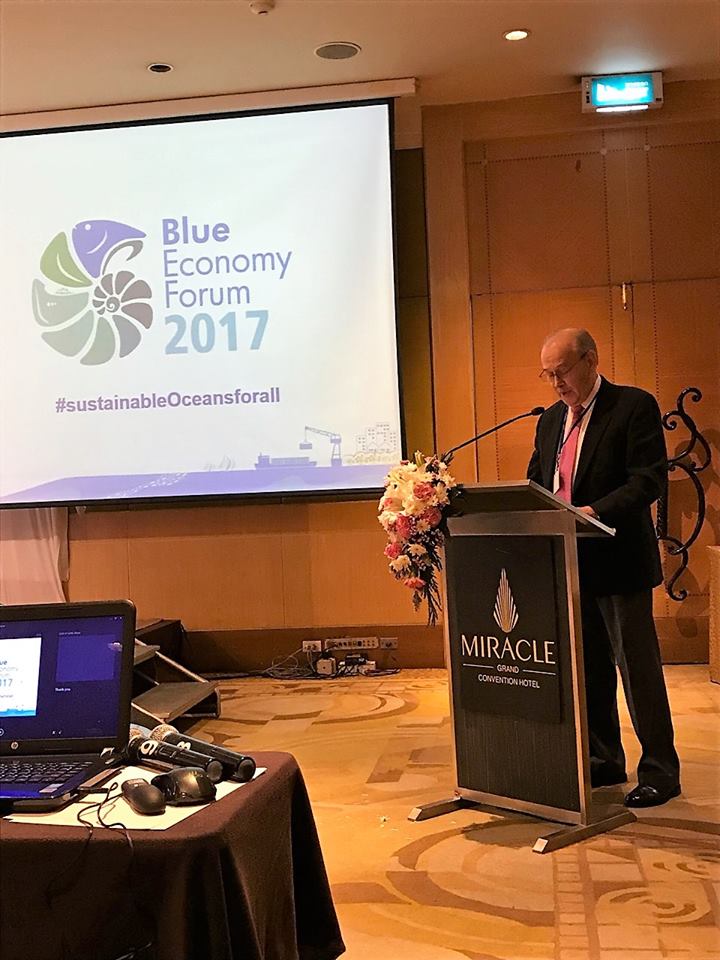
You cannot manage what you don’t measure - State of Oceans and Coasts Reporting
The ocean economy in East Asia is estimated at around US$724 billion, contributing to the GDPs of countries in varying degrees, ranging from 3.3% in RO Korea and 7% in the Philippines, up to 28% in Indonesia and as much as 87% in Timor Leste. For seven countries in the region, the estimated value of coastal and marine ecosystems is around US$197 billion. Mr. Ross shared that “while there is no universally accepted definition of ‘blue economy’, it is PEMSEA’s consideration that knowing the structure of the ocean economy, inclusive of ecosystem services, which represent the natural capital of the oceans, is critically important in the region’s quest to move from a ‘business-as-usual economic model’ to a blue economy model”.
Nine countries—Cambodia, China, Indonesia, Malaysia, Philippines, RO Korea, Thailand, Timor Leste and Viet Nam—presented their respective State of Oceans and Coasts Reports, which emphasize a blue economy theme. The SOC presentations focused on several aspects of ocean health and economy, including contribution to GDP and employment, valuation of ecosystem services, coverage and condition of coastal and marine ecosystems, marine environmental quality, risks and threats and plans and policies for response.
A session chaired by Gordon Johnson, United Nations Development Programme (UNDP) Bangkok, examined the state of large marine ecosystems (LMEs) in the region—the Sulu-Sulawesi Seas, Yellow Sea, Arafura-Timor Seas and South China Sea—including their significant physical, biological and socioeconomic features, and major transboundary issues. Participants agreed that shared resources in the LMEs require shared responsibility to address transboundary issues and foster blue economy development. Results from LME projects can be sustained beyond their project duration by institutionalizing innovations and lessons learned, creating stronger intergovernmental platforms and cooperation, and by establishing trust among countries and various stakeholders through iterative consultations.
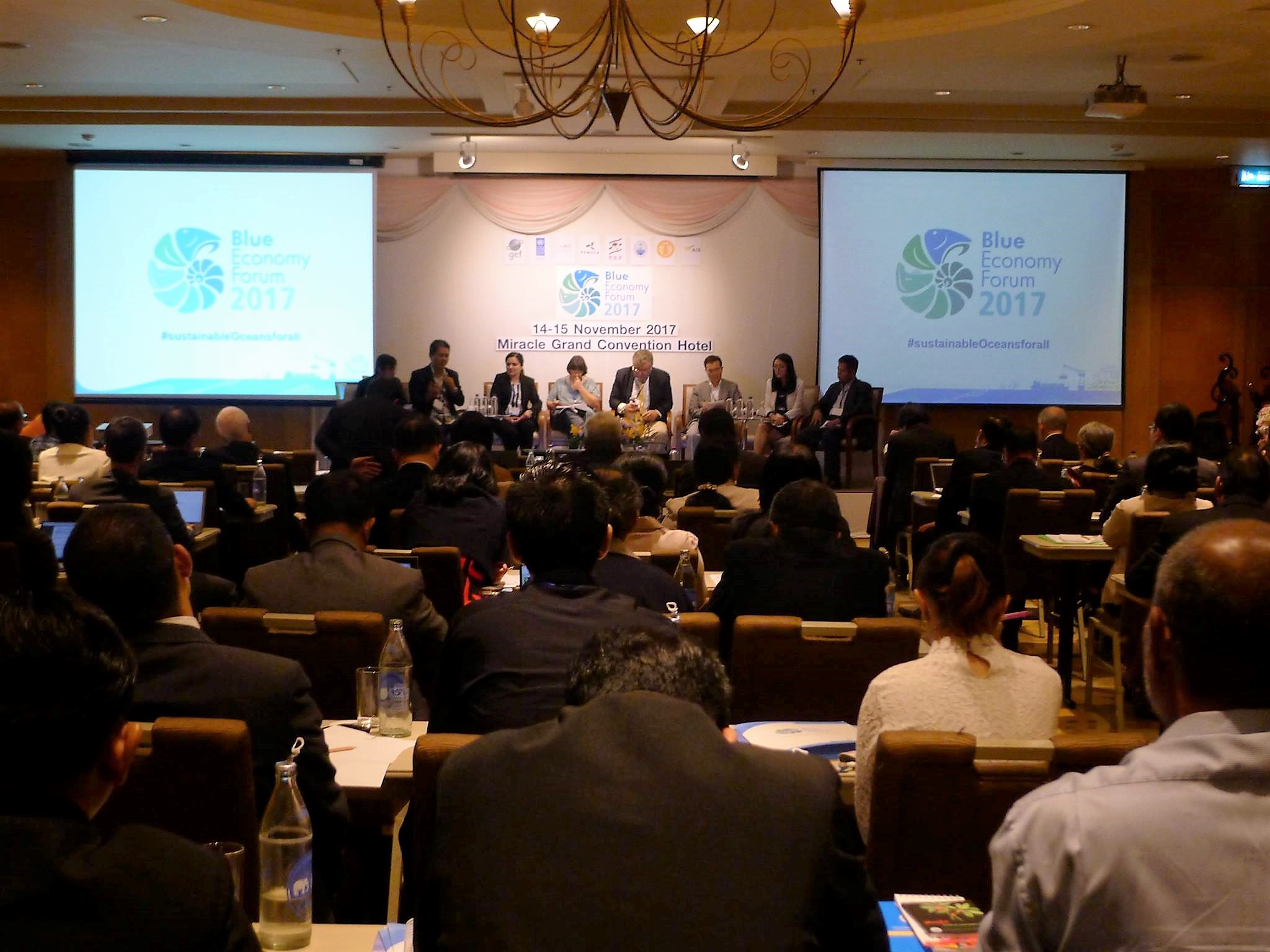
Navigating the paradigm shift: oceans as natural capital and good business
The environment for ocean investments is changing, with new demands and emerging market opportunities. Progress and results of blue economy projects in Thailand were shared in a session chaired by Dr. Nawarat Krairapanond, Director of Environment Fund Office, Office of Natural Resources and Environmental Policy and Planning (ONEP), MONRE, Thailand. The session demonstrated how innovations in technology, policies and management are harnessing the potential of oceans while ensuring financial returns, economic growth, social inclusion and the sustainability of the marine environment and resources.
Contributions to energy and food security, tourism, travel, trade and climate change mitigation and adaptation were also deliberated during a session chaired by Ms. Waraporn Hirunwatsiri of the World Bank. The panel presented five examples of how key ocean economic sectors are transforming to blue economy, including ecotourism and marine parks (Malaysia), ocean energy (RO Korea), green ports (Malaysia), climate-smart aquaculture (Viet Nam) and sustainable tuna fisheries (Western and Central Pacific Fisheries Commission). Ms. Hirunwatsiri emphasized that “to maintain the ocean economy’s long-term potential for growth and job creation, integrated ocean management needs to be improved, including ecosystem preservation at the local, regional, national and international levels. This will require significant innovation and new thinking in science, data, technology, R&D, manufacturing, infrastructure design, consultation and decision-making processes and institutional cooperation, and in the policy mix that governments implement to support and encourage innovative capacity in the ocean economy.”
Blue solutions and policies for protecting ocean health and communities
A session chaired by Jerker Tamelander, UN Environment and Coordinator for the Coordinating Body for Seas of East Asia (COBSEA), co-chaired by Dr. Hugh Kirkman, former head of COBSEA, drew attention to important actions for a) protecting coastal and marine ecosystems through marine spatial planning (MSP), marine protected areas (MPAs) and community-based and co-management approaches, b) addressing illegal fishing through electronic catch documentation and traceability systems, ecosystem approach to fisheries management and partnership with the private sector and c) mitigating marine pollution through wastewater and septage management. Such blue economy initiatives contribute to the achievement SDG 14 targets, and can be adopted and replicated across the region.
A session chaired by Atty. Roberto Oliva from the ASEAN Center of Biodiversity featured insightful discussions on ways to seek support for blue economy investment from governments, development partners and the private sector. The panelists delved into the national ocean policies of Indonesia, Thailand and Japan and their outcomes, as well as enabling conditions for the achievement of the SDGs, along with blue economy development in the fisheries, ports and shipping, tourism and marine renewable energy sectors. Commitment of heads of states and local governments, regulations backed by funding, partnership with the private sector, inter-agency and intersectoral coordination and public awareness are critical for effective enforcement. Investing in people, education and capacity development for scientists, planners, managers and regulators is also essential.
Conclusions and recommendations from the forum were presented by PEMSEA’s Maria Corazon M. Ebarvia, including the suggestion that the Blue Economy Forum be held regularly and used as a mechanism for monitoring ocean health and ocean economy, identifying growth and investment opportunities and promoting policies to enable blue economy development. Mr. Dhana Yingcharoen, Department of Marine and Coastal Resources (DMCR), MONRE, Thailand closed the event, encouraging participants to continue their efforts in developing the SOC reports and using the knowledge and experiences shared during the forum to craft policies and develop initiatives to strengthen blue economy in the region.

